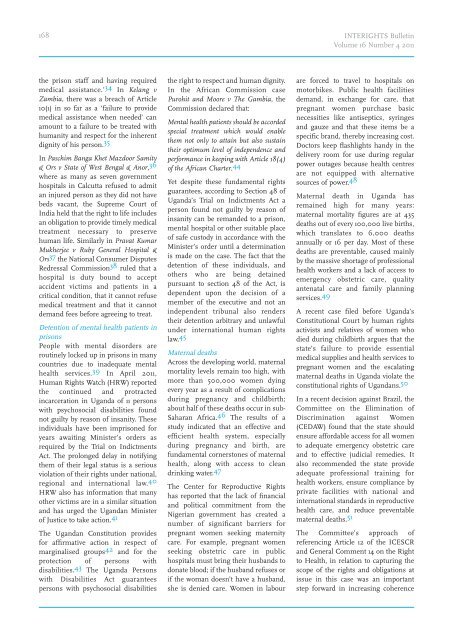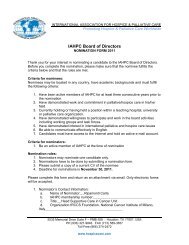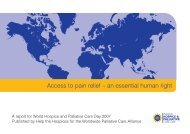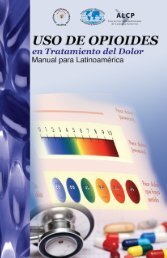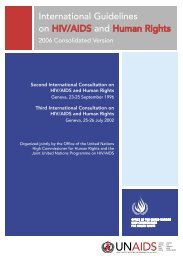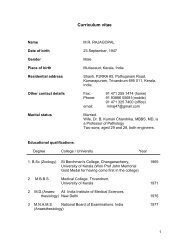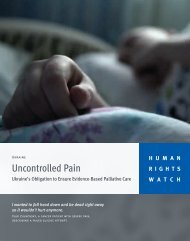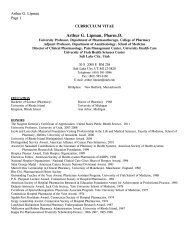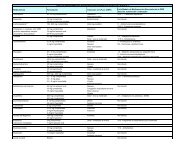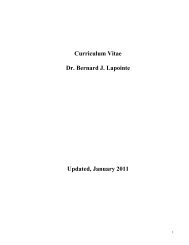INTERIGHTS Bulletin
INTERIGHTS Bulletin
INTERIGHTS Bulletin
Create successful ePaper yourself
Turn your PDF publications into a flip-book with our unique Google optimized e-Paper software.
168<br />
<strong>INTERIGHTS</strong> <strong>Bulletin</strong><br />
Volume 16 Number 4 2011<br />
the prison staff and having required<br />
medical assistance.’ 34 In Kelang v<br />
Zambia, there was a breach of Article<br />
10(1) in so far as a ‘failure to provide<br />
medical assistance when needed’ can<br />
amount to a failure to be treated with<br />
humanity and respect for the inherent<br />
dignity of his person. 35<br />
In Paschim Banga Khet Mazdoor Samity<br />
& Ors v State of West Bengal & Anor, 36<br />
where as many as seven government<br />
hospitals in Calcutta refused to admit<br />
an injured person as they did not have<br />
beds vacant, the Supreme Court of<br />
India held that the right to life includes<br />
an obligation to provide timely medical<br />
treatment necessary to preserve<br />
human life. Similarly in Pravat Kumar<br />
Mukherjee v Ruby General Hospital &<br />
Ors 37 the National Consumer Disputes<br />
Redressal Commission 38 ruled that a<br />
hospital is duty bound to accept<br />
accident victims and patients in a<br />
critical condition, that it cannot refuse<br />
medical treatment and that it cannot<br />
demand fees before agreeing to treat.<br />
Detention of mental health patients in<br />
prisons<br />
People with mental disorders are<br />
routinely locked up in prisons in many<br />
countries due to inadequate mental<br />
health services. 39 In April 2011,<br />
Human Rights Watch (HRW) reported<br />
the continued and protracted<br />
incarceration in Uganda of 11 persons<br />
with psychosocial disabilities found<br />
not guilty by reason of insanity. These<br />
individuals have been imprisoned for<br />
years awaiting Minister’s orders as<br />
required by the Trial on Indictments<br />
Act. The prolonged delay in notifying<br />
them of their legal status is a serious<br />
violation of their rights under national,<br />
regional and international law. 40<br />
HRW also has information that many<br />
other victims are in a similar situation<br />
and has urged the Ugandan Minister<br />
of Justice to take action. 41<br />
The Ugandan Constitution provides<br />
for affirmative action in respect of<br />
marginalised groups 42 and for the<br />
protection of persons with<br />
disabilities. 43 The Uganda Persons<br />
with Disabilities Act guarantees<br />
persons with psychosocial disabilities<br />
the right to respect and human dignity.<br />
In the African Commission case<br />
Purohit and Moore v The Gambia, the<br />
Commission declared that:<br />
Mental health patients should be accorded<br />
special treatment which would enable<br />
them not only to attain but also sustain<br />
their optimum level of independence and<br />
performance in keeping with Article 18(4)<br />
of the African Charter. 44<br />
Yet despite these fundamental rights<br />
guarantees, according to Section 48 of<br />
Uganda’s Trial on Indictments Act a<br />
person found not guilty by reason of<br />
insanity can be remanded to a prison,<br />
mental hospital or other suitable place<br />
of safe custody in accordance with the<br />
Minister’s order until a determination<br />
is made on the case. The fact that the<br />
detention of these individuals, and<br />
others who are being detained<br />
pursuant to section 48 of the Act, is<br />
dependent upon the decision of a<br />
member of the executive and not an<br />
independent tribunal also renders<br />
their detention arbitrary and unlawful<br />
under international human rights<br />
law. 45<br />
Maternal deaths<br />
Across the developing world, maternal<br />
mortality levels remain too high, with<br />
more than 500,000 women dying<br />
every year as a result of complications<br />
during pregnancy and childbirth;<br />
about half of these deaths occur in sub-<br />
Saharan Africa. 46 The results of a<br />
study indicated that an effective and<br />
efficient health system, especially<br />
during pregnancy and birth, are<br />
fundamental cornerstones of maternal<br />
health, along with access to clean<br />
drinking water. 47<br />
The Center for Reproductive Rights<br />
has reported that the lack of financial<br />
and political commitment from the<br />
Nigerian government has created a<br />
number of significant barriers for<br />
pregnant women seeking maternity<br />
care. For example, pregnant women<br />
seeking obstetric care in public<br />
hospitals must bring their husbands to<br />
donate blood; if the husband refuses or<br />
if the woman doesn’t have a husband,<br />
she is denied care. Women in labour<br />
are forced to travel to hospitals on<br />
motorbikes. Public health facilities<br />
demand, in exchange for care, that<br />
pregnant women purchase basic<br />
necessities like antiseptics, syringes<br />
and gauze and that these items be a<br />
specific brand, thereby increasing cost.<br />
Doctors keep flashlights handy in the<br />
delivery room for use during regular<br />
power outages because health centres<br />
are not equipped with alternative<br />
sources of power. 48<br />
Maternal death in Uganda has<br />
remained high for many years:<br />
maternal mortality figures are at 435<br />
deaths out of every 100,000 live births,<br />
which translates to 6,000 deaths<br />
annually or 16 per day. Most of these<br />
deaths are preventable, caused mainly<br />
by the massive shortage of professional<br />
health workers and a lack of access to<br />
emergency obstetric care, quality<br />
antenatal care and family planning<br />
services. 49<br />
A recent case filed before Uganda’s<br />
Constitutional Court by human rights<br />
activists and relatives of women who<br />
died during childbirth argues that the<br />
state’s failure to provide essential<br />
medical supplies and health services to<br />
pregnant women and the escalating<br />
maternal deaths in Uganda violate the<br />
constitutional rights of Ugandans. 50<br />
In a recent decision against Brazil, the<br />
Committee on the Elimination of<br />
Discrimination against Women<br />
(CEDAW) found that the state should<br />
ensure affordable access for all women<br />
to adequate emergency obstetric care<br />
and to effective judicial remedies. It<br />
also recommended the state provide<br />
adequate professional training for<br />
health workers, ensure compliance by<br />
private facilities with national and<br />
international standards in reproductive<br />
health care, and reduce preventable<br />
maternal deaths. 51<br />
The Committee’s approach of<br />
referencing Article 12 of the ICESCR<br />
and General Comment 14 on the Right<br />
to Health, in relation to capturing the<br />
scope of the rights and obligations at<br />
issue in this case was an important<br />
step forward in increasing coherence


